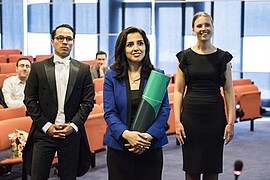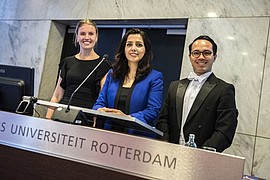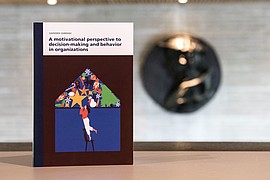PhD Defence: Saeedeh Ahmadi

In her dissertation ‘A motivational perspective to decision-making and behavior in organizations’ Saeedeh Ahmadi focuses on motivation as a main driver of strategic preferences and behaviors in organizations.
Saeedeh Ahmadi defended her dissertation in the Senate Hall at Erasmus University Rotterdam on Thursday, 13 June 2019 at 11:30. Her supervisors were Prof. Justin Jansen (RSM) and Prof. Tom Mom (RSM). Other members of the Doctoral Committee are Prof. Taco Reus (RSM), Dr Luca Berchicci (RSM), Prof. Michaela Schippers (RSM), Dr Flore Bridoux (University of Amsterdam) and Dr J.P. Eggers (New York University).
About Saeedeh Ahmadi

Saeedeh Ahmadi (born in Tehran) received bachelor of industrial engineering from Khaje Nasir university and master of management from Sharif university, Tehran. After a couple of years working in telecommunication industry, she obtained a master of Data-mining and Statistics from Linkoping university Sweden. She started her PhD in the department of Strategic Management and Entrepreneurship of Rotterdam School of Management, Erasmus University Rotterdam in 2014. As a part of her PhD trajectory, she also visited Leonard Stern School of Business, New York University in 2017.
Saeedeh’s research is at the nexus of strategic management, innovation management, and psychology. Focusing on managerial decision-making in uncertain situations, she tries to understand what makes managers oriented toward riskier options, why some managers get out of comfort zone and why others do not or delay some actions. She is also enthusiastic about assessing the effectiveness of managerial interventions that try to motivate variety seeking and idea generation in organizations. Saeedeh has presented her research in the prominent international management conferences such as Academy of Management and Strategic Management Society. She has taught in master level and supervised thesis in both bachelor and master levels. She has served as ad-hoc reviewer of Journal of management Studies and Psychological Reports.
Saeedeh Currently works as assistant professor of Strategic Management at the Department of International Strategy and Marketing of Amsterdam Business School, University Van Amsterdam.
Thesis Abstract

At the intersection of strategic management and applied psychology research, this dissertation focuses on motivation as a main driver of strategic preferences and behaviors in organizations. It explains micro level drivers of managers’ preferences in trade-offs related to responding the uncertainties of emerging technologies through a motivation lens, and further combines a capability lens with motivation to investigate the preference of the manager for the delay in investment on an emerging technology. It also explains the exploratory behavior of front-line employees in generating ideas for new business in response to a motivating intervention via stretch goals.
The findings are as following. 1) Manager’s orientation toward search, risk-taking, and experimentation is shaped not only by their own motivational systems rooted in their characters, but also by the fit between their motivational systems and the motivational cues in the organization as well as the complexity of the decision-making situation, while there is an asymmetry in response to opposing motivational cues. 2) Stretch goals indeed foster exploratory behaviors to fuel innovation processes in organization, by increasing participation of employees in idea generation for new business opportunities although they may not be as effective in increasing the effort of those employees who have been participating. When it comes to performance outcomes, the difficulty and novelty of stretch goals make individuals less sensitive to the results of their efforts. As such, the paradoxical nature of stretch goals, results in to both intended and unintended performance outcomes. They seem to be more effective for the individuals who are already able to discern the good ideas from the bad based on their experience and seniority. 3) The tradeoffs managers see in early versus late investment in an emerging technology is directly and indirectly affected by their perception of the gap between current capabilities of the firm and what is requires to be successful in the emerging technology. However, it is the motivational cue in the context that interferes with this perception and shapes the final judgements of the managers
Photos: Hans / Capital Images


